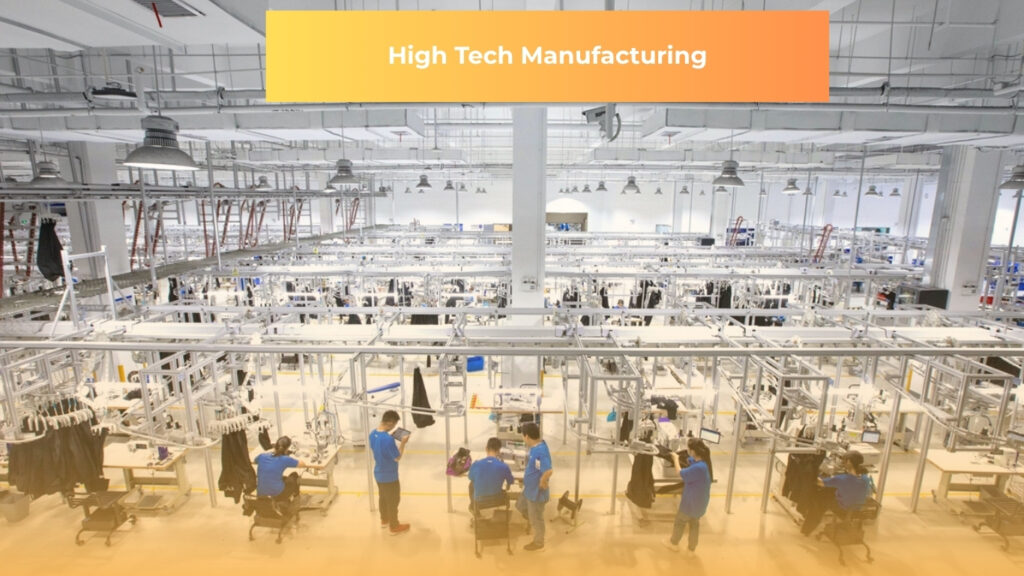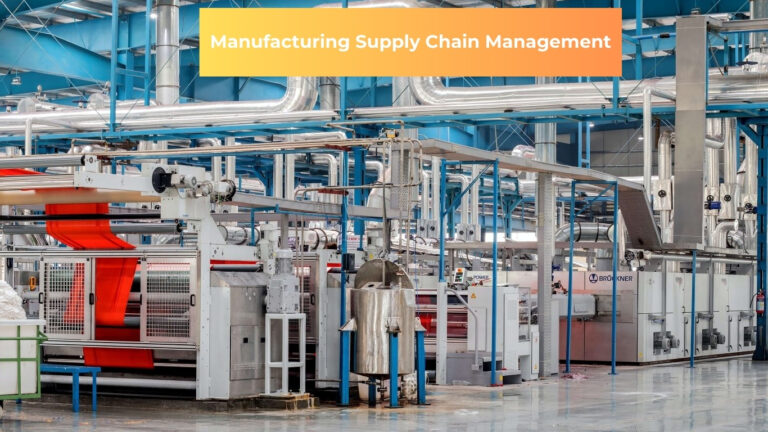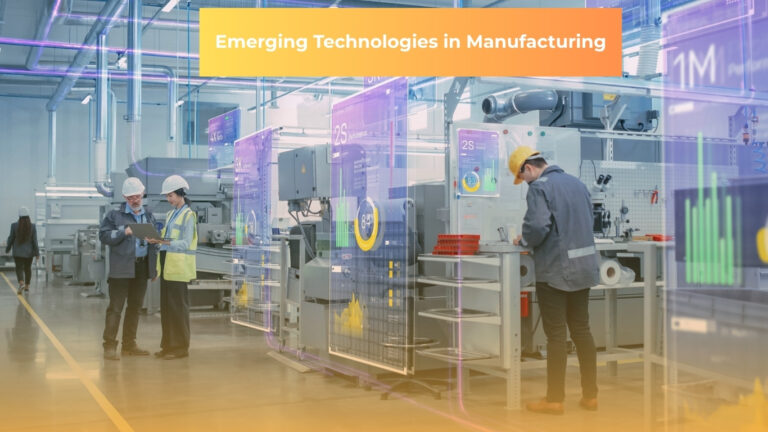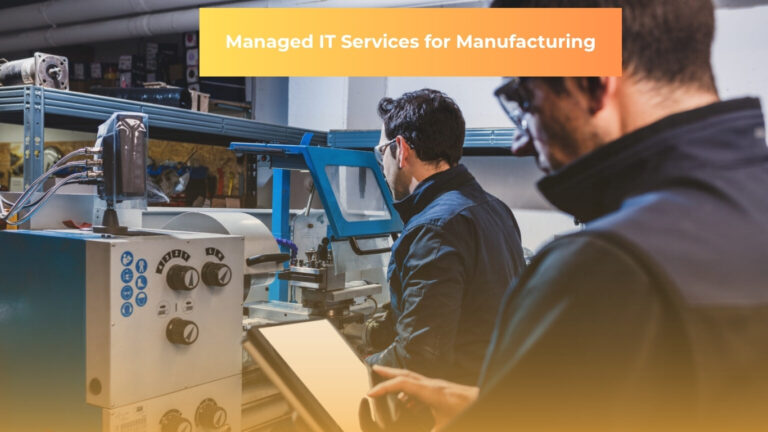Discover high tech manufacturing innovations, ERP solutions, and CPQ systems revolutionizing advanced manufacturing. Learn about quality control, smart manufacturing, and Industry 4.0 trends.
Introduction to High Tech Manufacturing
The global manufacturing landscape is experiencing an unprecedented transformation driven by technological innovation and digital advancement. High tech manufacturing has emerged as the cornerstone of modern industrial production, fundamentally reshaping how products are designed, produced, and delivered across industries worldwide.
In 2024, the high tech manufacturing sector represents a critical driver of economic growth, with the global advanced manufacturing market valued at USD 151.54 billion in 2023 and projected to reach USD 535.5 billion by 2030, exhibiting a remarkable compound annual growth rate (CAGR) of 24.4%. This explosive growth reflects the increasing adoption of cutting-edge technologies that are revolutionizing traditional manufacturing processes.
Manufacturing companies are no longer simply converting raw materials into finished products through mechanized processes. Today’s high tech manufacturing enterprises leverage sophisticated technologies including artificial intelligence, robotics, Internet of Things (IoT), and cloud computing to create intelligent, responsive, and highly efficient production environments.
The shift toward high tech manufacturing is being driven by several compelling factors: the need for greater precision and quality control, rising consumer expectations for customized products, supply chain resilience requirements, and the imperative to achieve sustainable manufacturing practices. Companies that embrace these advanced manufacturing technologies are positioning themselves for long-term competitive advantage in an increasingly complex global marketplace.
What is High Tech Manufacturing?
What is high tech manufacturing? This question lies at the heart of understanding modern industrial transformation. High tech manufacturing refers to the production of advanced technological products using cutting-edge techniques, processes, and materials that require significant technological expertise and sophisticated equipment.
Manufacturing becomes high tech manufacturing when businesses implement sophisticated, usually computer-controlled equipment to produce products that demand exceptional precision, quality, and reliability. This transformation is characterized by the integration of digital technologies such as automation, robotics, artificial intelligence, and the Internet of Things into every aspect of the production process.

Key characteristics that define high tech manufacturing include:
– Complex Production Processes: High tech manufacturing involves intricate production workflows that require state-of-the-art machinery and highly skilled personnel with specialized technical knowledge. These processes often demand precise environmental controls, contamination prevention, and rigorous documentation.
– Advanced Technology Integration: Modern high tech manufacturing facilities incorporate cyber-physical systems, real-time data analytics, and machine learning algorithms to optimize production efficiency and product quality.
– Precision Requirements: Products in high tech manufacturing sectors require exceptional accuracy and consistency, where even minimal variations can result in significant quality issues or safety concerns.
– Research and Development Intensity: High tech manufacturing companies typically invest heavily in continuous innovation and R&D activities to develop better technologies and maintain competitive advantages.
The scope of high tech manufacturing encompasses diverse industries including semiconductors, aerospace, pharmaceuticals, medical devices, automotive electronics, and advanced materials production. Each sector brings unique challenges and requirements that demand specialized manufacturing approaches and technologies.
According to industry classifications, high tech manufacturing includes pharmaceutical production, computer and electronic manufacturing, optical equipment, air and spacecraft-related machinery, and other technology-intensive sectors. These industries share common characteristics of high R&D intensity, skilled workforce requirements, and significant capital investments in advanced production equipment.
Key Components of High Tech Quality Manufacturing
- High tech quality manufacturing represents the gold standard for modern production excellence, integrating advanced technologies with rigorous quality control processes to deliver products that consistently meet or exceed predetermined standards. Understanding the essential components of high tech quality manufacturing is crucial for companies seeking to achieve operational excellence and competitive differentiation.
- Zero-Defect Manufacturing (ZDM) Implementation: The foundation of high tech quality manufacturing lies in Zero-Defect Manufacturing principles, which aim to produce products right the first time through data-driven technologies and comprehensive quality enhancement strategies. This approach minimizes waste of any kind while improving quality across all manufacturing aspects including product design, process optimization, and service delivery.
- Advanced Quality Management Systems: High tech quality manufacturing relies on sophisticated Quality Management Systems (QMS) that ensure product quality, safety, and compliance with industry standards and regulations. These systems incorporate quality planning, inspection and testing protocols, non-conformance management, and corrective and preventive actions (CAPA) to maintain consistently high standards.
- Real-Time Process Control: Modern high tech quality manufacturing environments utilize Industrial IoT sensors and connected devices to monitor production parameters continuously. These systems provide real-time visibility into manufacturing processes, enabling immediate detection and correction of quality issues before they impact final products.
- Predictive Quality Analytics: High tech quality manufacturing leverages artificial intelligence and machine learning algorithms to analyze production data and predict potential quality issues. These predictive capabilities allow manufacturers to implement proactive measures that prevent defects rather than simply detecting them after occurrence.
- Digital Twin Technology: High tech quality manufacturing increasingly incorporates digital twin technology to create virtual representations of physical production systems. These digital replicas enable manufacturers to simulate processes, optimize parameters, and test improvements without disrupting actual production operations.
- Automated Inspection Systems: High tech quality manufacturing facilities deploy advanced automated inspection technologies including computer vision, machine learning, and AI-powered quality control systems. These systems can detect defects and anomalies with greater accuracy and consistency than traditional manual inspection methods.
CONTACT US FOR A FREE CONSULTATION!
Continuous Improvement Culture: Successful high tech quality manufacturing operations foster a culture of continuous improvement where quality enhancement is everyone’s responsibility. This involves regular process reviews, employee training programs, and systematic implementation of best practices across all manufacturing activities.
The integration of these components creates a comprehensive high tech quality manufacturing ecosystem that delivers superior products while optimizing operational efficiency and reducing costs. Companies that successfully implement these elements position themselves as leaders in their respective markets.
ERP for High Tech Manufacturing: Streamlining Operations
Enterprise Resource Planning (ERP) systems have become indispensable tools for ERP for high tech manufacturing companies seeking to integrate complex business operations and achieve operational excellence. Modern ERP for high tech manufacturing solutions provide comprehensive platforms that connect every aspect of production, from supply chain management to quality control and customer delivery.
– Cloud-Based ERP Solutions Leading the Way: In 2024, ERP for high tech manufacturing is increasingly dominated by cloud-based platforms that offer unprecedented scalability, flexibility, and accessibility. Cloud ERP systems enable real-time collaboration across global manufacturing networks while providing automatic updates and reduced IT infrastructure requirements. Manufacturing companies are investing heavily in cloud ERP solutions, with technology investments accounting for 30% of operating budgets compared to 23% in 2023.
– AI-Driven Automation in Manufacturing ERP: The latest ERP for high tech manufacturing systems incorporate artificial intelligence and machine learning capabilities to automate complex tasks including demand forecasting, production scheduling, inventory optimization, and predictive maintenance. These AI-powered processes reduce operational downtime, minimize waste, and improve overall manufacturing efficiency through intelligent decision-making.
– Real-Time Data Analytics and Decision Making: Modern ERP for high tech manufacturing platforms excel in collecting and processing data from every corner of the production process. These systems provide valuable insights into performance metrics, supply chain management, and customer demand patterns, enabling manufacturers to make data-driven decisions faster and more accurately.
– Integration with Manufacturing Execution Systems: Advanced ERP for high tech manufacturing solutions seamlessly integrate with Manufacturing Execution Systems (MES) to provide comprehensive shop floor control and real-time production monitoring. This integration enables manufacturers to track material movement, monitor equipment performance, and ensure quality compliance throughout the production lifecycle.
– Supply Chain Management Optimization: ERP for high tech manufacturing systems provide powerful supply chain management capabilities including demand forecasting, supplier relationship management, and logistics optimization. These features help manufacturers navigate complex global supply chains while maintaining cost efficiency and delivery reliability.
– Quality Management Integration: Leading ERP for high tech manufacturing platforms incorporate robust Quality Management System (QMS) capabilities that ensure product quality, safety, and regulatory compliance. These integrated QMS features include quality planning, inspection protocols, non-conformance tracking, and corrective action management.

The selection of appropriate ERP for high tech manufacturing solutions requires careful consideration of industry-specific requirements including product lifecycle management, complex bill of materials handling, and regulatory compliance capabilities. Companies that successfully implement comprehensive ERP systems typically achieve significant improvements in operational efficiency, cost reduction, and customer satisfaction.
CPQ High-Tech Manufacturing Solutions
Configure, Price, Quote (CPQ) systems have revolutionized sales and production processes in CPQ high-tech manufacturing environments, enabling companies to handle complex product configurations while maintaining accuracy and speed in customer interactions. Modern CPQ high-tech manufacturing solutions address the unique challenges of engineering-to-order and mass customization manufacturing models.
- 100% Quote and Configuration Accuracy: CPQ high-tech manufacturing systems eliminate quotation errors by automating complex product configuration processes. These platforms enable sales teams to create customized quotes in minutes instead of days while ensuring complete accuracy in pricing, specifications, and manufacturing feasibility. Advanced CPQ high-tech manufacturing solutions incorporate product rules and constraints that prevent impossible configurations from being quoted.
- Visual Product Configuration: Leading CPQ high-tech manufacturing platforms provide sophisticated 3D visualization capabilities that allow customers and sales representatives to configure products visually. These systems enable real-time customization with instant pricing updates, helping customers understand the impact of their choices on both product functionality and cost.
- Engineer-to-Order Capabilities: CPQ high-tech manufacturing solutions excel in supporting engineer-to-order business models where products are designed and manufactured according to specific customer requirements. These systems automatically generate engineering documents, CAD drawings, bills of materials, and manufacturing instructions once orders are confirmed, streamlining the transition from sales to production.
- Real-Time Pricing and Margin Management: Advanced CPQ high-tech manufacturing systems calculate prices in real-time based on predefined pricing rules and current cost structures. This capability ensures that quotes reflect accurate margins while enabling sales teams to optimize pricing strategies for different customer segments and market conditions.
- CAD Automation and Documentation Generation: CPQ high-tech manufacturing platforms integrate with computer-aided design (CAD) systems to automatically generate 2D and 3D drawings for configured products. This automation eliminates manual engineering work for routine configurations while ensuring that production teams receive accurate, shop-ready documentation.
- Omnichannel Sales Support: Modern CPQ high-tech manufacturing solutions support multiple sales channels including direct sales, partner networks, and self-service portals. This omnichannel approach ensures consistent product definitions and pricing across all customer touchpoints while enabling customers to configure and purchase products through their preferred channels.
- Integration with Manufacturing Systems: CPQ high-tech manufacturing platforms seamlessly integrate with ERP systems, manufacturing execution systems, and supply chain management tools. This integration ensures that confirmed orders flow smoothly into production planning and execution without manual intervention or data re-entry.
The implementation of comprehensive CPQ high-tech manufacturing solutions enables companies to reduce sales cycle times, improve quote accuracy, and enhance customer satisfaction while supporting complex product customization requirements. Organizations that successfully deploy these systems typically achieve significant improvements in sales productivity and manufacturing efficiency.
Advanced Manufacturing Technologies Driving Innovation
The landscape of high tech manufacturing is being fundamentally transformed by a convergence of advanced manufacturing technologies that enable unprecedented levels of efficiency, precision, and customization. These cutting-edge technologies are reshaping production processes across industries and creating new possibilities for innovation and competitive advantage.
- Additive Manufacturing and 3D Printing: Additive manufacturing represents one of the most significant advanced manufacturing technologies revolutionizing high tech manufacturing operations. According to recent industry analysis, 3D printing accounts for 39% of advanced manufacturing technology activities in Europe and serves as the largest technology area within the advanced manufacturing domain. These technologies enable the production of complex geometries and customized products with minimal waste and reduced lead times.

- Industrial Robotics and Automation: Advanced manufacturing technologies in robotics have evolved beyond simple repetitive tasks to incorporate artificial intelligence, machine learning, and collaborative capabilities. Modern robotic systems facilitate precision manufacturing, heavy lifting operations, and complex assembly processes while maintaining high levels of safety and quality consistency.
- Internet of Things (IoT) Integration: The integration of IoT devices and sensors represents a cornerstone of advanced manufacturing technologies enabling real-time monitoring and control of manufacturing processes. Industrial IoT implementations provide manufacturers with unprecedented visibility into equipment performance, process parameters, and product quality metrics.
- Artificial Intelligence and Machine Learning: AI and machine learning technologies are becoming integral components of advanced manufacturing technologies ecosystems. These systems enable predictive maintenance, quality optimization, process automation, and intelligent decision-making that improve overall manufacturing effectiveness and reduce operational costs.
- Edge Computing for Real-Time Processing: Advanced manufacturing technologies increasingly incorporate edge computing capabilities that bring computational power directly to manufacturing equipment. This approach reduces latency in critical decision-making processes and enables real-time responses to changing production conditions.
- Digital Twin Technology: Digital twin implementations represent sophisticated advanced manufacturing technologies that create virtual replicas of physical manufacturing systems. These technologies enable process simulation, optimization testing, and predictive analysis without disrupting actual production operations.
- Advanced Materials and Nanotechnology: The development and application of advanced materials, including high-strength alloys, smart materials, and nanotechnology-enhanced substances, are expanding the possibilities for high tech manufacturing. These materials enable the production of products with enhanced performance characteristics and novel functionalities.
- 5G Connectivity and Network Infrastructure: The deployment of 5G technology is enabling new levels of connectivity and data transfer capabilities in high tech manufacturing environments. This enhanced connectivity supports real-time coordination of complex manufacturing systems and enables new applications in remote monitoring and control.
Companies that successfully integrate these advanced manufacturing technologies into their operations achieve significant competitive advantages including improved product quality, reduced manufacturing costs, faster time-to-market, and enhanced customer satisfaction.
Smart Manufacturing and Industry 4.0 Integration
The evolution toward smart manufacturing represents a fundamental paradigm shift in high tech manufacturing, driven by the comprehensive integration of digital technologies, artificial intelligence, and interconnected systems that create intelligent, autonomous production environments. This transformation, often referred to as Industry 4.0, is reshaping the entire manufacturing landscape and creating unprecedented opportunities for operational excellence.
- Cyber-Physical Systems Integration: Smart manufacturing implementations rely on sophisticated cyber-physical systems that seamlessly blend physical production equipment with digital monitoring and control capabilities. These integrated systems enable real-time communication between machines, sensors, and control systems, creating responsive manufacturing environments that can adapt automatically to changing conditions.
- End-to-End Supply Chain Visibility: Modern smart manufacturing systems provide comprehensive visibility across entire supply chains through IoT sensors, digital twins, and advanced analytics platforms. This visibility enables manufacturers to monitor supplier performance, track material flows, and predict potential disruptions before they impact production schedules.
- Autonomous Production Systems: Advanced smart manufacturing environments incorporate autonomous systems capable of making independent decisions about production parameters, quality control, and resource allocation. These systems utilize machine learning algorithms and artificial intelligence to optimize production processes continuously without human intervention.
- Predictive Maintenance and Equipment Optimization: Smart manufacturing platforms excel in predictive maintenance applications that use sensor data and analytics to forecast equipment failures and maintenance requirements. This capability reduces unplanned downtime, extends equipment lifecycles, and optimizes maintenance costs across manufacturing operations.
- Real-Time Quality Control: Smart manufacturing systems implement continuous quality monitoring through advanced sensor technologies and AI-powered inspection systems. These capabilities enable immediate detection and correction of quality issues, ensuring that products consistently meet specifications throughout the production process.
- Flexible Manufacturing Systems: Smart manufacturing environments are designed for maximum flexibility, enabling rapid reconfiguration of production lines to accommodate different products or changing demand patterns. This flexibility is achieved through modular equipment designs, software-defined manufacturing processes, and intelligent automation systems.
- Data-Driven Decision Making: Smart manufacturing operations generate vast amounts of data that are processed through advanced analytics platforms to provide actionable insights for operational improvement. Manufacturing companies are increasingly investing in data analytics capabilities, with technology investments representing significant portions of operational budgets.
- Human-Machine Collaboration: Successful smart manufacturing implementations optimize the collaboration between human workers and automated systems. This approach leverages human creativity and problem-solving capabilities while utilizing automation for precision, consistency, and efficiency.
The integration of smart manufacturing principles with high tech manufacturing operations enables companies to achieve remarkable improvements in productivity, quality, and operational efficiency while maintaining the flexibility needed to respond to rapidly changing market conditions.
The Role of AI and Automation
Artificial intelligence and automation technologies have become fundamental enablers of high tech manufacturing excellence, driving unprecedented levels of efficiency, quality, and innovation across industrial operations. The strategic integration of AI and automation capabilities is transforming how manufacturers approach production planning, quality control, and operational optimization.
- Generative AI Applications in Manufacturing: Generative AI technologies are revolutionizing high tech manufacturing by enabling automated design generation, process optimization, and predictive modeling capabilities. According to recent industry analysis, 65% of manufacturing companies now utilize generative AI in their operations, representing a significant increase from one-third in 2023. These systems can automatically generate product designs, create production scenarios, and develop maintenance procedures that optimize manufacturing processes.
- AI-Powered Quality Control Systems: Advanced AI technologies enable high tech manufacturing companies to implement sophisticated quality control systems that surpass traditional inspection methods. Computer vision systems powered by machine learning algorithms can detect defects and anomalies with greater accuracy and consistency than human inspectors, while operating continuously without fatigue or inconsistency.
- Predictive Analytics and Maintenance: AI-driven predictive analytics systems analyze vast amounts of sensor data to forecast equipment failures, maintenance requirements, and production disruptions before they occur. These capabilities enable high tech manufacturing operations to transition from reactive maintenance approaches to proactive strategies that minimize downtime and optimize equipment performance.
- Autonomous Production Systems: Advanced automation technologies enable high tech manufacturing facilities to operate with minimal human intervention through intelligent systems that can make independent decisions about production parameters, resource allocation, and quality control. These autonomous systems continuously learn from operational data to improve their decision-making capabilities over time.
- Supply Chain Optimization: AI technologies enhance high tech manufacturing supply chain management through intelligent demand forecasting, supplier performance prediction, and logistics optimization. Machine learning algorithms analyze historical data, market trends, and external factors to generate accurate demand predictions that enable optimal inventory management and production planning.
- Process Optimization and Efficiency: AI and automation technologies enable high tech manufacturing companies to optimize complex production processes through real-time analysis of operational data. These systems can identify inefficiencies, recommend process improvements, and automatically adjust parameters to maximize productivity while maintaining quality standards.
- Human-AI Collaboration: Successful high tech manufacturing implementations focus on optimizing collaboration between human workers and AI systems rather than simply replacing human capabilities. This collaborative approach leverages human creativity, problem-solving skills, and adaptability while utilizing AI for data processing, pattern recognition, and routine decision-making tasks.
- Robotics and Intelligent Automation: Modern robotic systems incorporate AI capabilities that enable them to perform complex tasks, adapt to changing conditions, and collaborate safely with human workers. These intelligent automation systems are particularly valuable in high tech manufacturing applications that require precision, consistency, and reliability.
The continued advancement of AI and automation technologies promises to further transform high tech manufacturing operations, enabling new levels of efficiency, quality, and customization that were previously unattainable through traditional manufacturing approaches.
Future Trends and Market Outlook
The high tech manufacturing sector is poised for continued growth and transformation, driven by technological advancement, changing market demands, and evolving global economic conditions. Industry analysis reveals significant opportunities and challenges that will shape the future of manufacturing operations worldwide.
– Market Growth Projections: The global manufacturing market is estimated to reach USD 20.76 trillion by 2032, exhibiting a compound annual growth rate (CAGR) of 4.9% from 2025 to 2032. The advanced manufacturing sector specifically is projected to grow from USD 151.54 billion in 2023 to USD 535.5 billion by 2030, representing a remarkable CAGR of 24.4%. This explosive growth reflects increasing adoption of high tech manufacturing technologies across industries.
– Regional Manufacturing Leadership: Asia Pacific continues to dominate the global high tech manufacturing landscape, holding a 42.7% market share in 2025. China leads global manufacturing output with 27.7% of total production, followed by the United States at 17.3%. The European Union is also experiencing significant growth, with the number of firms engaged in advanced manufacturing more than doubling between 2009 and 2023, growing faster than the United States.
– Technology Investment Trends: Manufacturing companies are substantially increasing their technology investments, with technology spending accounting for 30% of operating budgets in 2024 compared to 23% in 2023. Cloud computing, generative AI, and 5G technologies are delivering the highest returns on investment, driving continued adoption across high tech manufacturing operations.
– Sustainability and Carbon Neutrality: Environmental sustainability is becoming a critical driver in high tech manufacturing development. Companies are increasingly focusing on achieving net-zero carbon emissions, implementing circular economy principles, and developing sustainable manufacturing processes. This trend is creating new opportunities for innovative technologies and business models that support environmental objectives.
– Workforce Evolution and Skills Development: The high tech manufacturing sector faces significant workforce challenges, with nearly 60% of manufacturers citing difficulty attracting and retaining qualified employees as their primary concern. This challenge is driving investment in worker training programs, automation technologies, and human-machine collaboration systems that augment human capabilities.
CONTACT US FOR A FREE CONSULTATION!
– Supply Chain Resilience: Recent global disruptions have highlighted the importance of supply chain resilience in high tech manufacturing operations. Companies are investing in supply chain diversification, nearshoring initiatives, and digital technologies that provide greater visibility and flexibility in managing complex global supply networks.
– Industry 4.0 Maturation: The adoption of Industry 4.0 technologies continues to accelerate, with high tech manufacturing companies implementing comprehensive digital transformation initiatives. These implementations focus on creating intelligent, connected manufacturing systems that can respond dynamically to changing market conditions and customer requirements.
– Emerging Technology Integration: New technologies including quantum computing, advanced materials, and biotechnology are beginning to impact high tech manufacturing operations. These emerging technologies promise to enable new product categories and manufacturing capabilities that could further transform industrial production.
– Global Trade and Policy Impacts: International trade policies, tariff structures, and geopolitical tensions continue to influence high tech manufacturing location decisions and supply chain strategies. Companies are increasingly considering these factors in their long-term strategic planning and investment decisions.
The outlook for high tech manufacturing remains strongly positive, with continued growth expected across most sectors and regions. Companies that successfully navigate technological transformation, workforce challenges, and supply chain complexity will be well-positioned to capitalize on the significant opportunities ahead.
HBLAB’s Expertise in High Tech Manufacturing Solutions
HBLAB stands at the forefront of high tech manufacturing digital transformation, delivering cutting-edge software development and AI solutions that empower manufacturers to achieve operational excellence and competitive advantage. With over 630+ skilled professionals and extensive experience across multiple industries, HBLAB provides comprehensive technology solutions tailored specifically for high tech manufacturing environments.
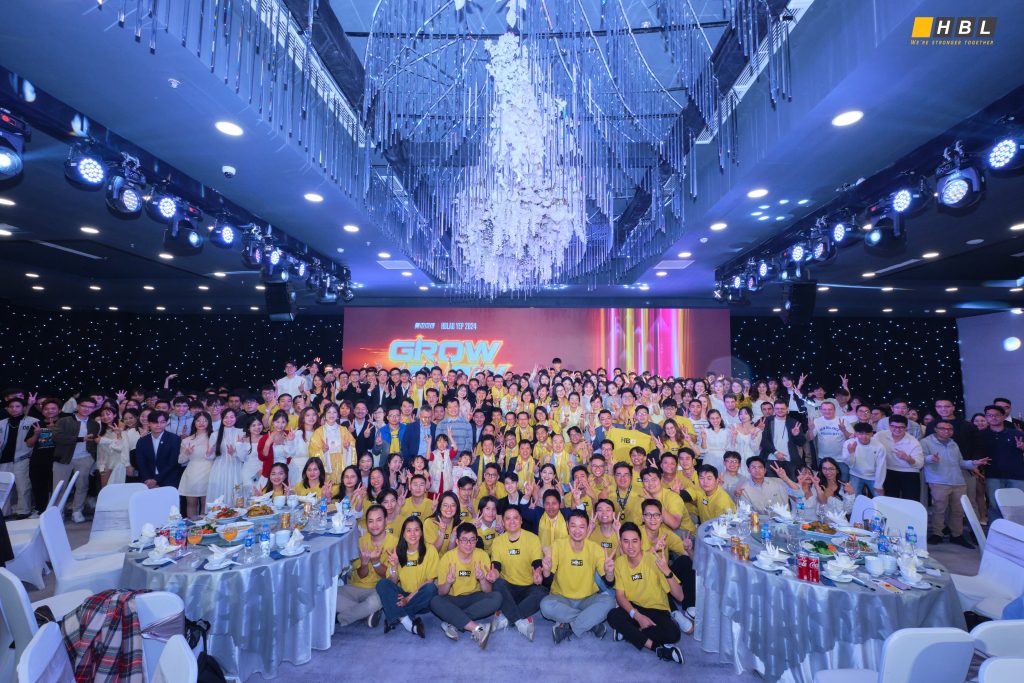
- AI-Driven Manufacturing Solutions: HBLAB’s expertise in artificial intelligence and machine learning technologies enables high tech manufacturing companies to implement sophisticated automation and optimization systems. Our AI development team, comprising over 40 specialists including PhD-level experts, has successfully delivered projects that automate complex manufacturing processes, optimize quality control systems, and enhance predictive maintenance capabilities. HBLAB’s strategic partnership with Vietnam’s AI Institute, backed by a $300,000 investment, demonstrates our commitment to advancing AI innovation in manufacturing applications.
- Manufacturing System Integration: HBLAB’s comprehensive approach to high tech manufacturing system development addresses the complete spectrum of manufacturing challenges, from workflow design and quality control to inventory tracking and compliance management. Our experienced team develops integrated solutions that connect disparate manufacturing systems, enabling seamless data flow and coordinated operations across complex production environments.
- Industry 4.0 Implementation: HBLAB’s technological expertise encompasses the full range of Industry 4.0 technologies essential for modern high tech manufacturing operations. Our solutions include IoT integration, real-time data analytics, cloud computing platforms, and digital twin implementations that transform traditional manufacturing operations into intelligent, connected systems.
- Quality Management Systems: Understanding the critical importance of quality in high tech manufacturing, HBLAB develops comprehensive quality management solutions that ensure consistent product excellence and regulatory compliance. Our systems integrate advanced inspection technologies, real-time monitoring capabilities, and predictive quality analytics to maintain the highest manufacturing standards.
- ERP and Enterprise Integration: HBLAB’s expertise in enterprise system development enables high tech manufacturing companies to implement sophisticated ERP solutions that integrate all aspects of their operations. Our team has extensive experience developing custom ERP systems that address the unique requirements of manufacturing environments, including complex bill of materials management, production scheduling, and supply chain coordination.
- Global Partnership Network: HBLAB’s international presence, including operations in Japan, Singapore, Australia, and other key markets, positions us to support high tech manufacturing companies operating in global markets. Our strategic partnerships, including recent collaboration agreements with Japanese technology companies, enable us to deliver solutions that meet international standards and regulatory requirements.
- Proven Track Record: With over 300 completed projects and a 90% customer retention rate, HBLAB has demonstrated consistent success in delivering high-quality technology solutions for high tech manufacturing clients. Our recognition as a Top 10 Vietnam IT company and Top 10 AI company for multiple consecutive years reflects our expertise and reliability in the technology sector.
- Comprehensive Service Offerings: HBLAB provides end-to-end high tech manufacturing technology solutions including custom software development, system integration, managed services, and ongoing technical support. Our agile development methodologies and customer-centric approach ensure that solutions are delivered on time and meet specific business requirements.
HBLAB’s commitment to innovation, technical excellence, and customer success makes us an ideal partner for high tech manufacturing companies seeking to leverage advanced technologies for competitive advantage. Our comprehensive understanding of manufacturing processes, combined with deep technical expertise in emerging technologies, enables us to deliver solutions that drive measurable business results.
Conclusion
The transformation of global manufacturing through high tech manufacturing innovations represents one of the most significant industrial revolutions in modern history. As we have explored throughout this comprehensive analysis, high tech manufacturing is fundamentally reshaping how products are conceived, designed, produced, and delivered across industries worldwide.
The convergence of advanced technologies including artificial intelligence, IoT, robotics, and cloud computing is creating unprecedented opportunities for manufacturers to achieve new levels of efficiency, quality, and customization. Companies that successfully embrace high tech manufacturing principles are positioning themselves for sustained competitive advantage in an increasingly complex and demanding global marketplace.
The market projections for high tech manufacturing are remarkably positive, with the advanced manufacturing sector expected to grow from USD 151.54 billion to USD 535.5 billion by 2030. This growth is being driven by increasing adoption of Industry 4.0 technologies, rising demand for customized products, and the imperative to achieve sustainable manufacturing practices.
Key enablers of successful high tech manufacturing transformation include comprehensive ERP systems that integrate complex operations, sophisticated CPQ solutions that support mass customization, and advanced quality management systems that ensure consistent excellence. The integration of AI and automation technologies is proving particularly valuable in optimizing production processes, predicting maintenance requirements, and enhancing quality control capabilities.
Looking ahead, high tech manufacturing will continue to evolve through the integration of emerging technologies including generative AI, quantum computing, and advanced materials. Companies that proactively invest in these technologies, while addressing workforce development and supply chain resilience challenges, will be best positioned to capitalize on future opportunities.
The importance of strategic partnerships with experienced technology providers cannot be overstated in successful high tech manufacturing transformations. Organizations like HBLAB, with deep expertise in manufacturing systems, AI technologies, and global market requirements, play crucial roles in enabling companies to navigate complex technology implementations and achieve measurable business results.
As the high tech manufacturing landscape continues to evolve at an accelerating pace, the companies that will thrive are those that view technology not as a cost center but as a strategic enabler of innovation, efficiency, and customer value creation.
Ready to Transform Your Manufacturing Operations? HBLAB’s expert team specializes in delivering cutting-edge high tech manufacturing solutions that drive operational excellence and competitive advantage. Contact us today to discover how our AI-powered systems and comprehensive technology expertise can revolutionize your manufacturing processes.
FAQ
Q: What industries benefit most from high tech manufacturing?
A: Industries that benefit most from high tech manufacturing include semiconductors, aerospace, pharmaceuticals, medical devices, automotive electronics, and advanced materials production. These sectors require high precision, quality control, and complex manufacturing processes.
Q: How does ERP for high tech manufacturing differ from traditional ERP?
A: ERP for high tech manufacturing includes specialized features like complex bill of materials management, quality management systems, product lifecycle management, and integration with manufacturing execution systems that are essential for advanced manufacturing operations.
Q: What are the key benefits of implementing CPQ in high-tech manufacturing?
A: CPQ high-tech manufacturing solutions provide 100% quote accuracy, visual product configuration, automated CAD generation, real-time pricing, and seamless integration with manufacturing systems, resulting in faster sales cycles and improved customer satisfaction.
Q: How is AI transforming high tech manufacturing operations?
A: AI is revolutionizing high tech manufacturing through predictive maintenance, automated quality control, process optimization, supply chain management, and autonomous production systems that improve efficiency and reduce costs.
Q: What role does sustainability play in high tech manufacturing?
A: Sustainability is increasingly important in high tech manufacturing, with companies focusing on net-zero carbon emissions, circular economy principles, and energy-efficient production processes to meet regulatory requirements and customer expectations.
Q: How can small and medium manufacturers adopt high tech manufacturing technologies?
A: SMEs can adopt high tech manufacturing technologies through cloud-based solutions, phased implementation approaches, strategic partnerships with technology providers, and focus on high-impact applications that deliver quick returns on investment.
Q: What skills are most important for high tech manufacturing workers?
A: High tech manufacturing requires skills in digital technologies, data analytics, automation systems, quality management, and continuous learning capabilities to adapt to evolving technology environments.
Q: How do digital twins benefit high tech manufacturing operations?
A: Digital twins enable high tech manufacturing companies to simulate processes, optimize parameters, predict maintenance needs, and test improvements virtually before implementing changes in physical production systems.
Q: What are the main challenges in implementing high tech manufacturing solutions?
A: Key challenges include high initial investment costs, workforce skill gaps, system integration complexity, and the need for comprehensive change management to ensure successful technology adoption.
Q: What trends will shape the future of high tech manufacturing?
A: Future trends include increased AI integration, sustainability focus, supply chain resilience, workforce augmentation, edge computing, and the continued evolution toward fully autonomous manufacturing systems.
CONTACT US FOR A FREE CONSULTATION
Read More:
– Ignite Business Growth: Mastering Advanced Distribution Management system
– Manufacturing Supply Chain Management: Optimizing Efficiency for Global Success (6 Case Studies)
– AI in Industrial Automation: The Definitive Guide Powering Smart Factories
